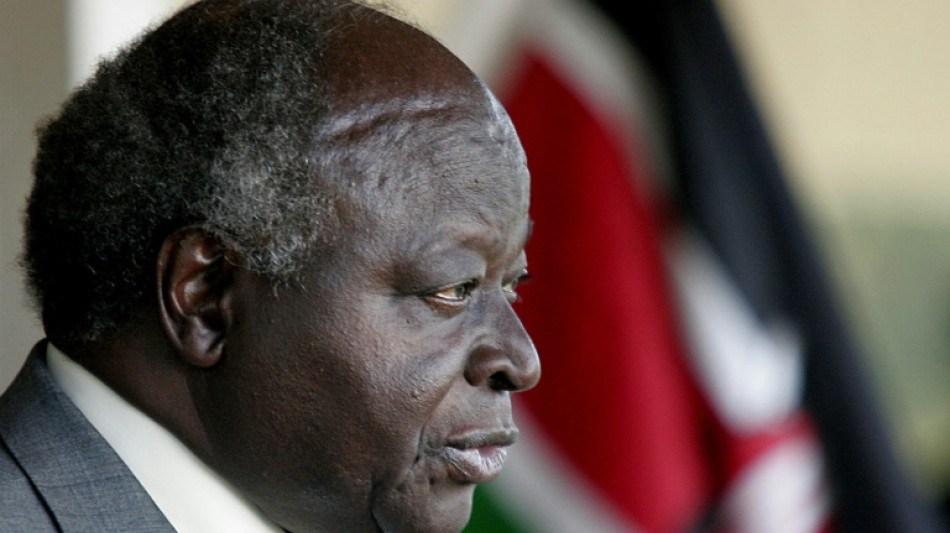
-
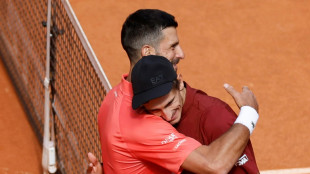 Djokovic crashes to nervous Arnaldi in Madrid opener
Djokovic crashes to nervous Arnaldi in Madrid opener
-
Syria's Kurds demand 'democratic decentralised' Syria
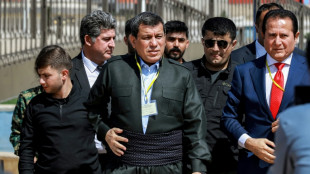
-
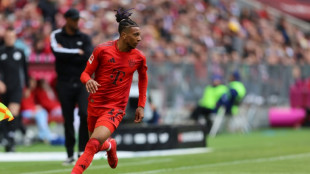 Leverkusen win to delay Bayern and Kane's title party
Leverkusen win to delay Bayern and Kane's title party
-
Buenos Aires farewells native pontiff with tears and calls to action
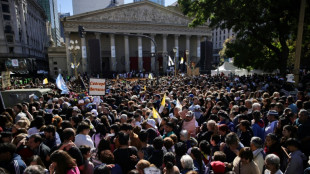
-
 Turkey's opposition says Erdogan's canal plan behind latest arrests
Turkey's opposition says Erdogan's canal plan behind latest arrests
-
Maresca hails 'nasty' Chelsea as top five bid stays alive

-
 Trump raises Putin doubts after Zelensky talks at pope's funeral
Trump raises Putin doubts after Zelensky talks at pope's funeral
-
Major blast at Iran port kills 4, injures hundreds

-
 Napoleon's sword to be sold at auction in Paris
Napoleon's sword to be sold at auction in Paris
-
Iran, US discuss nuclear deal in third round of talks

-
 Buenos Aires farewells native pontiff with call to action
Buenos Aires farewells native pontiff with call to action
-
Warholm sets hurdles world record at Diamond League, Holloway shocked

-
 US students 'race' sperm in reproductive health stunt
US students 'race' sperm in reproductive health stunt
-
Wikileaks founder Assange joins crowds for pope funeral

-
 Leader Marc Marquez claims Spanish MotoGP sprint victory
Leader Marc Marquez claims Spanish MotoGP sprint victory
-
Celtic win fourth successive Scottish Premiership title

-
 Jackson ends drought as Chelsea boost top five push
Jackson ends drought as Chelsea boost top five push
-
Warholm sets 300m hurdles world record in Diamond League opener

-
 Major blast at south Iran port kills 4, injures hundreds
Major blast at south Iran port kills 4, injures hundreds
-
Russia says retook Kursk from Ukraine with North Korean help

-
 Francis laid to rest as 400,000 mourn pope 'with an open heart'
Francis laid to rest as 400,000 mourn pope 'with an open heart'
-
Trump, Zelensky meet on sidelines of pope's funeral

-
 'Shared loss': Filipino Catholics bid Pope Francis farewell
'Shared loss': Filipino Catholics bid Pope Francis farewell
-
Families unable to reunite as India-Pakistan border slams shut
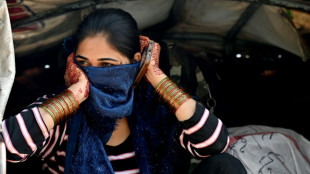
-
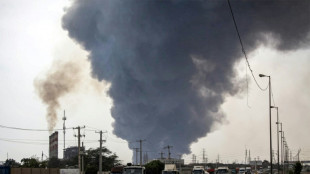 Major blast at south Iran port injures hundreds
Major blast at south Iran port injures hundreds
-
Foreign carmakers strive for 'China Speed' to stay in race
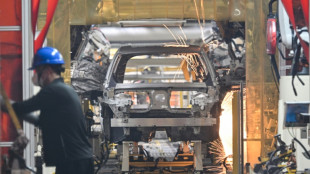
-
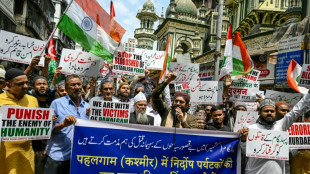 Pakistan says open to neutral probe into Kashmir attack after India threats
Pakistan says open to neutral probe into Kashmir attack after India threats
-
Hundreds of thousands at funeral mourn pope 'with an open heart'
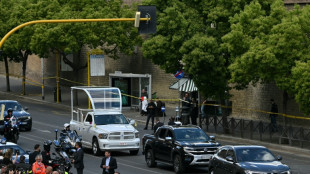
-
 Quartararo sets Spanish MotoGP record to claim pole
Quartararo sets Spanish MotoGP record to claim pole
-
Hamas says open to 5-year Gaza truce, one-time hostages release
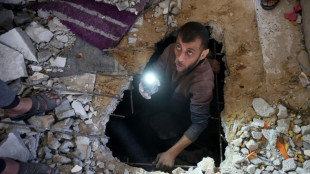
-
 Iran, US hold new round of high-stakes nuclear talks
Iran, US hold new round of high-stakes nuclear talks
-
Up at dawn for front-row seat to history at Francis's funeral

-
 Pakistan ready to 'defend sovereignty' after India threats
Pakistan ready to 'defend sovereignty' after India threats
-
Huge crowds flock to Vatican for Pope Francis's funeral

-
 Xi says China must 'overcome' AI chip challenges
Xi says China must 'overcome' AI chip challenges
-
Indian army says new exchange of gunfire with Pakistan

-
 Epstein accuser Virginia Giuffre takes own life in Australia: family
Epstein accuser Virginia Giuffre takes own life in Australia: family
-
Hundreds of buildings damaged, dozens injured in 6.3 Ecuador quake

-
 India and Pakistan's Kashmir fallout hits economy too
India and Pakistan's Kashmir fallout hits economy too
-
Francis's funeral to be grand farewell to 'pope of the poor'

-
 Pogacar faces defiant Evenepoel at Liege-Bastogne-Liege
Pogacar faces defiant Evenepoel at Liege-Bastogne-Liege
-
Chelsea eye great escape against Barcelona in Women's Champions League

-
 Iran, US to hold new round of high-level nuclear talks
Iran, US to hold new round of high-level nuclear talks
-
'Energy and effort' pay off for Reds as Blues' woes continue

-
 Albatross and closing birdie lift China's Liu to LPGA Chevron lead
Albatross and closing birdie lift China's Liu to LPGA Chevron lead
-
On the horizon? Wave of momentum for high seas treaty

-
 New to The Street Launches For The Causes(TM) Monthly Awareness Segments: Offering Free National Media to Charities and Organizations
New to The Street Launches For The Causes(TM) Monthly Awareness Segments: Offering Free National Media to Charities and Organizations
-
Top Mistakes to Avoid When Building Credit History

-
 Developing countries should fast-track US trade deals: World Bank president
Developing countries should fast-track US trade deals: World Bank president
-
Grizzlies' Morant 'doubtful' for must-win game 4 v Thunder


Mwai Kibaki: Former Kenyan president leaves mixed legacy
Kenya's third president Mwai Kibaki, who has died at the age of 90, led East Africa's economic powerhouse for over a decade, overseeing some of its bloodiest and most corrupt years but also ushering in a new constitution.
President from 2002-2013, Kibaki was a sharp-witted, wily and veteran leader involved in politics from the very birth of independent Kenya.
"President Kibaki will be forever remembered as the gentleman of Kenyan politics, a brilliant debater whose eloquence, wit, and charm won the day time-and-time again," his successor President Uhuru Kenyatta said in a statement on Friday in announcing his death.
But for a leader who was popularly swept into power in 2002 on an anti-corruption platform, Kibaki's tenure saw graft scandals where hundreds of millions of dollars were siphoned from public coffers.
On taking power in 2002 from the authoritarian rule of Daniel Arap Moi, Kibaki was welcomed for his promises of change and economic growth, but soon showed he was better suited to treading established paths.
"The initial response to corruption was very solid... but it became clear after a while that these scams reached all the way to the president himself," Kenya's former anti-corruption chief John Githongo said in British journalist Michela Wrong's book "It's Our Turn to Eat."
Most notorious of a raft of graft scandals was the multi-million-dollar Anglo Leasing case, which emerged in 2004 and involved public cash being paid to a complicated web of foreign companies for a range of services -- including naval ships and passports -- that never materialised.
- 'Political survivor' -
Yet Kibaki also boosted education and health sectors that were reeling from mismanagement under previous regimes, and launched ambitious infrastructure projects including large-scale road building. His government introduced free basic education for children and revamped hospitals.
"He was a political survivor," said Munene Macharia, a history professor at Nairobi's United States International University Africa.
Closer ties to China also boosted Kenya's economic role, even if critics say Kibaki's drive for growth came at a potential longer term cost for the nation with large-scale borrowing.
Golf-loving Kibaki, who retired with a golden sendoff of $180,000 plus $75,000 a year, also led Kenya during the most violent election in its history, when more than 1,100 people died in ethnic battles after disputed polls in 2007.
After a contentious win that the opposition decried as rigged, Kibaki was hurriedly sworn-in for a second term, prompting further violence that was resolved only after former UN chief Kofi Annan helped broker a deal.
The crisis rocked what had until then been Kibaki's most popular achievement -- a stable economy -- with hundreds of thousands forced from their homes, and Kenya's lucrative tourist industry left in tatters.
"One of his weaknesses was that he paid less attention to the destructive politics... by the time he acted the country was almost at war," said Peter Kagwanja, a former Kibaki adviser and academic.
- Lawmaker for five decades -
Kibaki grew up in a simple farming family in the Nyeri highland district and excelled at school.
He later studied economics and political science at Uganda's prestigious Makerere University and then the London School of Economics (LSE).
He was a lawmaker for five decades -- first elected in 1963 -- and he swiftly rose to be trade minister three years later.
He was also part of the team that drafted the constitution when Kenya became independent from Britain in 1963.
In the chaotic aftermath of the 2007-8 unrest, Kibaki would find himself in the unusual position of presiding over a referendum that overwhelmingly endorsed a new constitution aimed at averting a repeat of the violence.
The 2010 constitution maintained a presidential system, but introduced substantial checks with a devolved system of government.
"His greatest moment was the promulgation of the new constitution... It was a very deep and emotional moment for him," Kibaki's son Jimmy said in a documentary aired when he retired.
But he also left a complicated legacy for his successor Kenyatta who in 2007 had put his own presidential ambitions on hold in favour of Kibaki.
Kibaki kept a low profile since leaving office, making few public appearances. His health had fluctuated since a serious car accident in 2002 and he had been in and out of hospital in recent years.
G.Stevens--AMWN